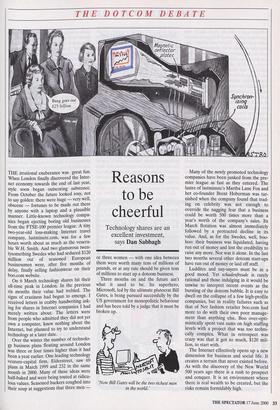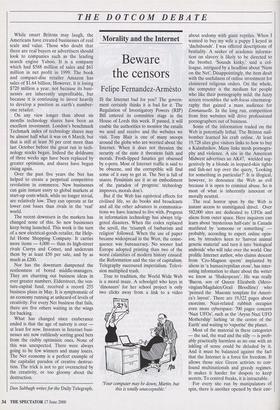THE DOTCOM DEBATE
THE irrational exuberance was great fun. When London finally discovered the Inter- net economy towards the end of last year, style soon began outscoring substance. From October the future looked rosy, not to say golden: there were huge — very well, obscene — fortunes to be made out there by anyone with a laptop and a plausible manner. Little-known technology compa- nies began ejecting boring old businesses from the FTSE-100 premier league. A tiny two-year-old loss-making Internet travel company, lastminute.com, was for a few hours worth about as much as the venera- ble W.H. Smith. And two glamorous twen- tysomething Swedes who had seduced $120 million out of seasoned European businessmen were, after five months of delay, finally selling fashionwear on their boo.com website.
On 6 March technology shares hit their all-time peak in London. In the previous six months their value had trebled. The Signs of craziness had begun to emerge. I received letters in crabby handwriting ask- ing for shares in Internet companies I had merely written about. The letters were from people who admitted they did not yet own a computer, knew nothing about the Internet, but planned to try to understand technology at a later date. Over the winter the number of technolo- gy business plans floating around London was three or four times higher than it had been a year earlier. One leading technology venture-capital firm, Elderstreet, saw 69 plans in March 1999 and 232 in the same month in 2000. Many of these ideas were half-baked and were being touted at ridicu- lous values. Seasoned backers coughed into their soup at suggestions that three men
Reasons to be cheerful
Technology shares are an excellent investment, says Dan Sabbagh
or three women — with one idea between them were worth many tens of millions of pounds, or at any rate should be given tens of millions to start up a dotcom business.
Three months on and the future ain't what it used to be. Its superhero, Microsoft, led by the ultimate plutocrat Bill Gates, is being pursued successfully by the US government for monopolistic behaviour and has been told by a judge that it must be broken up.
Now Bill Gates will be the two richest men in the world.' Many of the newly promoted technology companies have been junked from the pre- mier league as fast as they entered. The lustre of lastminute's Martha Lane Fox and her co-founder Brent Hoberman was tar- nished when the company found that trad- ing on celebrity was not enough to override the nagging fear that a business could be worth 500 times more than a year's worth of the company's sales. Its March flotation was almost immediately followed by a protracted decline in its value. And, as for the Swedes, well, boo- hoo: their business was liquidated, having run out of money and lost the credibility to raise any more. Nor was it alone. In the last two months several other dotcom start-ups have run out of money or laid off staff.
Luddites and nay-sayers must be in a good mood. Yet schadenfreude is rarely rational and those indulging in it would be unwise to interpret recent events as the bursting of the dotcom bubble. It is easy to dwell on the collapse of a few high-profile companies, but in reality failures such as that of Net fashion retailer boo.com had more to do with their own poor manage- ment than anything else. Boo over-opti- mistically spent vast sums on high staffing levels with a project that was too techni- cally complex. What in retrospect was crazy was that it got so much, $120 mil- lion, to start with.
The Internet effectively opens up a new dimension for business and social life. It creates a terrain that never existed before. As with the discovery of the New World 500 years ago there is a rush to prospect and conquer. It is an environment where there is real wealth to be created, but the risks remain formidably high.
THE DOTCOM DEBATE
While smart Britons may laugh, the Americans have created businesses of real scale and value. Those who doubt that there are real buyers or advertisers should look to companies such as the leading search engine Yahoo. It is a company which had $588 million of sales and $61 million in net profit in 1999. The book and compact-disc retailer Amazon has sales of $1.64 billion. However, it is losing $720 million a year, not because its busi- nesses are inherently unprofitable, but because it is continuing to invest heavily to develop a position as earth's number- one retailer.
On any view longer than about six months technology shares have been an excellent investment. London's benchmark Techmark index of technology shares may be almost half what it was on 6 March, but that is still at least 50 per cent more than last October before the great run in tech- nology stocks began. Indeed the doldrums of three weeks ago have been replaced by greater optimism, and shares have begun rising again.
Over the past five years the Net has helped to create a perpetual competitive revolution in commerce. New businesses can gain instant entry to global markets at start-up costs which, while no longer trivial, are relatively low. They can operate at far lower cost bases than rivals in the `real' world.
The recent downturn in the markets has changed none of this. So new businesses keep being launched. This week is the turn of a new electrical-goods retailer, the Help- ful Home Shopping Company. It carries more items — 4,000 — than its high-street rivals Currys and Comet, and undercuts them by at least 150 per sale, and by as much as £200.
Nor has the downturn dampened the restlessness of bored middle-managers. They are churning out business ideas in ever greater numbers. Elderstreet, the ven- ture-capital fund, received a record 255 business plans in May. It is symptomatic of an economy running at unheard-of levels of creativity. For every Net business that fails, there are five others waiting in the wings for backing.
What has changed since exuberance ended is that the age of naivety is over — at least for now. Investors in Internet busi- nesses are now ruthlessly sorting good bets from the risibly optimistic ones. None of this was unexpected. There were always going to be few winners and many losers. The Net economy is a perfect example of the capitalist paradox of creative destruc- tion. The trick is not to get overexcited by the creativity, or too gloomy about the destruction.
Dan Sabbagh writes for the Daily Telegraph.











































































 Previous page
Previous page